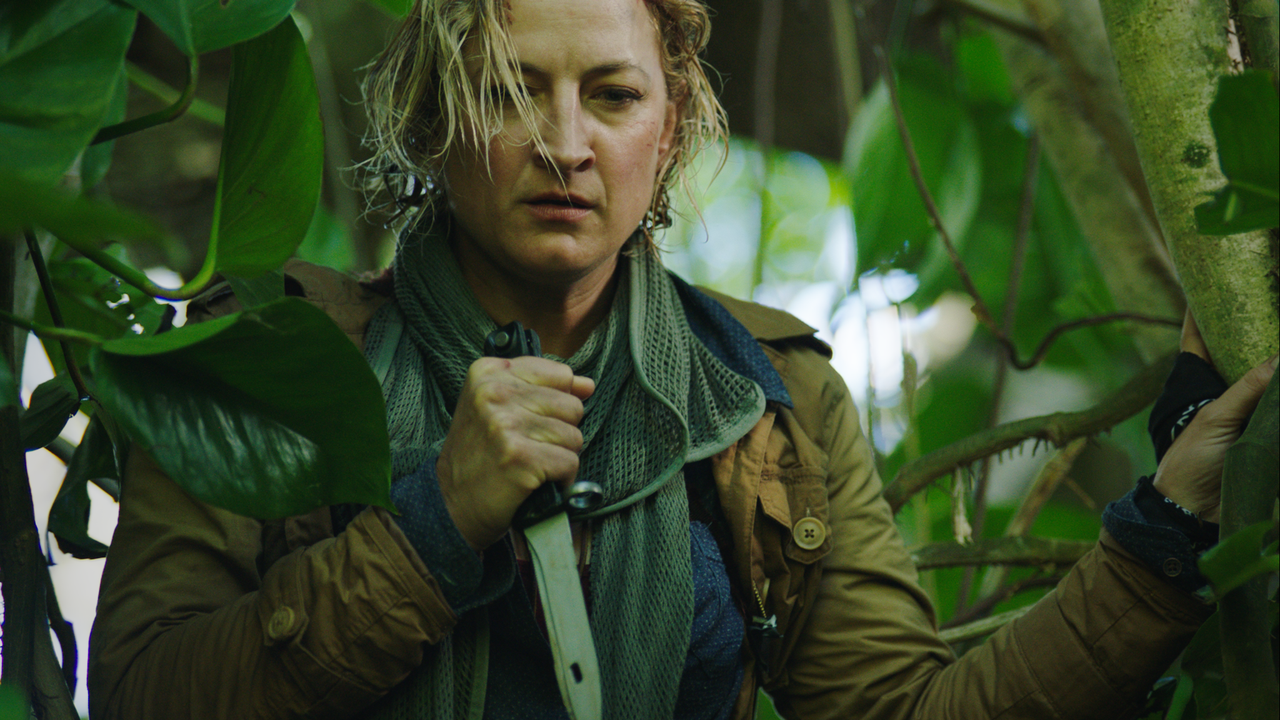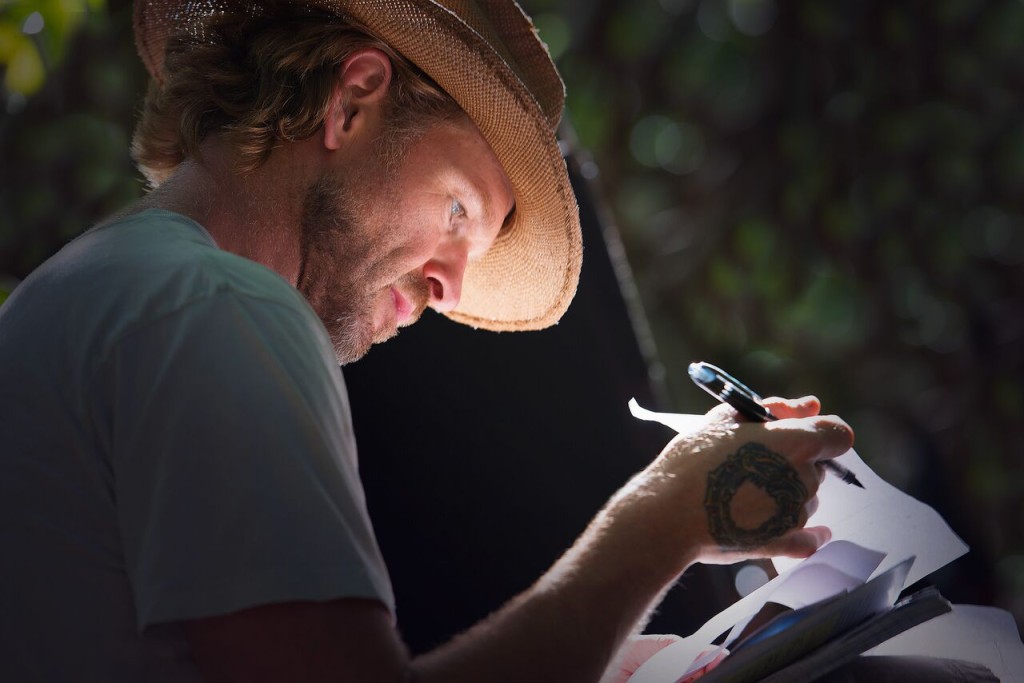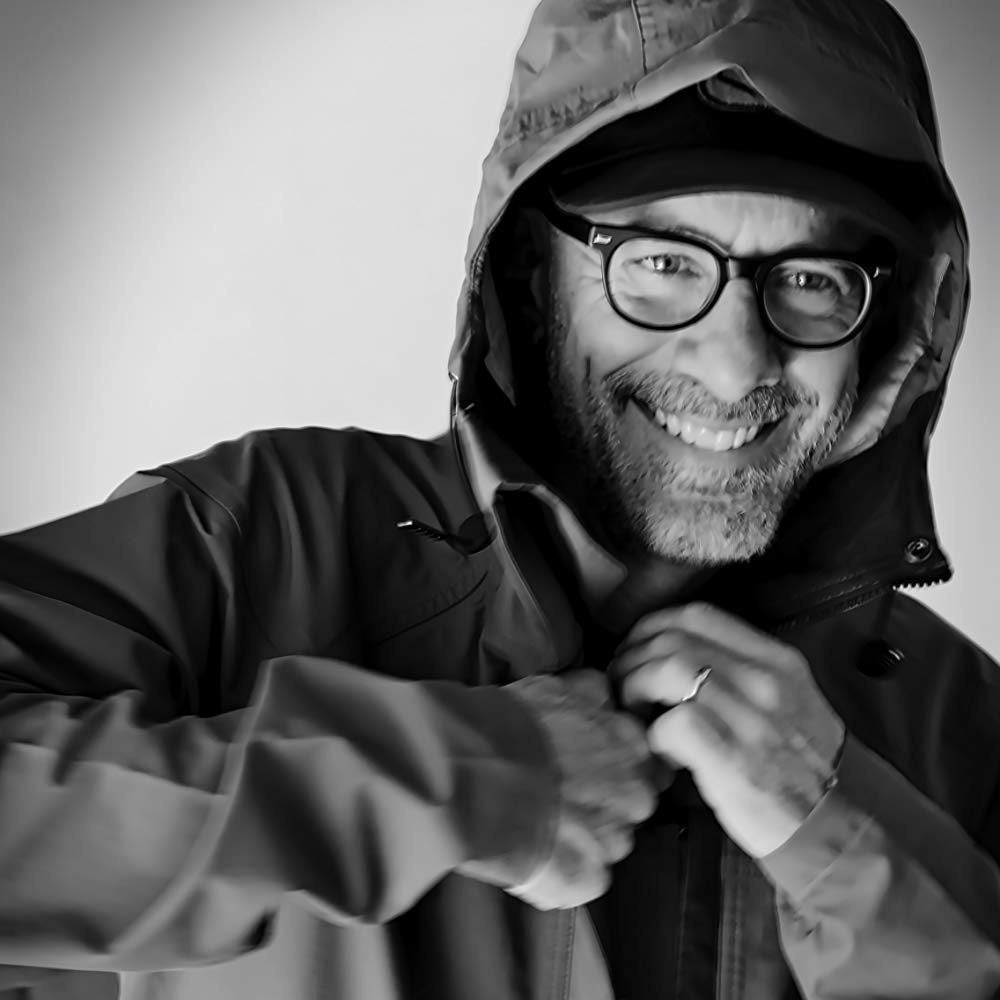If you’re a fan of edgy horror movies or have attended a genre film fest over the past few years, you’re probably familiar with the works of SpectreVision. The production company focuses on boundary-pushing genre films, having produced last year’s Spirit Award-nominated A Girl Walks Home Alone at Night and horror/comedy Cooties, plus critically-acclaimed festival hits Toad Road, LFO, The Boy, and one of Sundance 2016’s most talked-about films, The Greasy Strangler. And as SpectreVision has expanded its focus into the music, TV, and digital worlds, the three company founders continue to pursue their own individual careers as well: Elijah Wood has the acting thing; Daniel Noah screenwriting; and JOSH C. WALLER is making a name for himself as a director.
Waller’s third directorial feature CAMINO (written and produced by Noah) hits theaters on March 4 with a VOD and iTunes release on March 8, courtesy of distributor XLrator Media.
The thriller is set in 1980s Colombia (though filmed in Hawaii), where photojournalist Avery Taggert is assigned to document a charismatic missionary known as “El Guero” and soon finds herself on a run through the jungle trying to escape the more-sinister-than-he-seems leader. Stuntwoman-turned-leading-lady Zoë Bell (Death Proof and The Hateful Eight as well as Waller’s feature directorial debut Raze) stars as Avery, with Oscar-nominated filmmaker Nacho Vigalondo as El Guero. Camino co-stars Tenoch Huerta, Sheila Vand, Dominic Rains, and Kevin Pollak.
In anticipation of the film’s release, we got a chance to speak with Waller about his producing and directing careers, striving for equality in the film industry, and making connections on the film festival circuit.
——
COLIN McCORMACK: As a co-founder of SpectreVision, your mission has been to sort of “elevate” genre films. I was curious of what different types of things you were looking to do with Camino in terms of the action/thriller genre?
JOSH WALLER: In terms of elevating [the horror genre], I don’t think that we have any kind of larger mission than to just tell stories and support unique voices in filmmaking. I think that’s our only objective. We try to shy away from anything that we’ve seen before or anything that in the world is too saturated, we try to stay away from anything like that. And we also try to avoid anything that is purely exploitation, like gore for the sake of gore or nudity for the sake of nudity. Everything that should be in the film should push the story forward. So that’s kind of where we come from with the company. And although Camino isn’t necessarily a SpectreVision film, there’s a world where you could say it is, because SpectreVision to us is greater than the sum of just the three of us. For us it’s hopefully representative of the community that we’re in. So there’s a world in which you could say [Camino] is a SpectreVision film because [of] Daniel and I. The same principles were applied: Let’s try to tell an interesting narrative through action, which is kind of something that Zoë and I tried to do before when we made Raze. Let’s [make] a film that would typically reside purely in an exploitational world and let’s try to take it seriously.
CM: Is there a different process of seeking out projects you want to produce versus the ones you want to write or direct?
JW: No– hold on one sec, [yelling to someone on the street] Noah Greenberg! I’m sorry– I’m literally walking on the streets of New York and I just saw the cinematographer from Camino. Not a joke! And he’s also the DP from The Boy.
CM: That’s great! Small world.
JW: So random! [Laughs]
So there’s no different process [between selecting producing or directing projects]. Because as a company, we aren’t actively seeking out projects. In the beginning we were, but now we’re lucky enough to have a pretty steady stream of submissions and a team of readers that are headed up by Daniel that are just always reading these incredible, interesting scripts. So we’re always getting really cool stuff, and the fact of the matter is unfortunately we have to say “no” most of the time because we just don’t have the bandwidth. And we never wanted to be one of those companies– we never wanted to be transactional producers. Not just take on a project, then you don’t get traction in six months and be like, “Fuck it,” and just throw it away and leave the filmmaker on their own to just starve. If we’re going to commit to something, we’re going to commit for the long haul, and that’s a serious commitment.
In terms of me being a director, my agents and everything send me stuff and [laughs]— I don’t think they’re always happy with me because I’m super– not snobby, I’m just picky. I also have a lot of stories that I want to tell myself. Like Cooties, which SpectreVision did, that was a short story that I had written long ago. And I wasn’t the right person to bring it to life as a director or as a screenwriter, but it was a story we wanted to tell.
CM: I wanted to talk about working with Zoë Bell, who you’d worked with on Raze. But it seems that in Camino you cast her as more of an “everywoman” type of role. She has to rise to the occasion and fight; she’s not the asskicker from the get-go. Were you looking to tap into a different side that audiences hadn’t seen from her before?
JW: Yeah. Zoë has been a close friend of Daniel’s and mine for almost a decade now… She was just venturing into acting, the only thing she’d done was Death Proof at the time. And we got to know her as a friend first and we’d see her over the years doing action stuff or stunt stuff and we knew as her friends that she had so much more to offer. She has a rich emotional life and the fact that she also has this other skill set – being stunts – that’s amazing, that’s a huge, huge bonus of course. But I’m not interested in working with people that only have one set of skills, they have to be well-rounded. I think for Zoë, this is a matter of her bringing the same level of discipline and drive that she brought to her stunt career, bringing that same level of commitment to pursuing and training herself as an actor so she can feel as comfortable with the acting as she does with the stunt side. And fortunately, she’s impressive. I’m always impressed by her as an emotional actor and as a stuntwoman as well.
For me, I don’t like watching action films where the woman or whomever is super frail and doesn’t look like [they can fight]– Zoë actually looks like she could fuck you up. And she probably could. As a real person Zoë Bell would never do that because she’s the sweetest person ever, however she could if she wanted to! [Laughs]

CM: Could you talk a little about directing fight scenes and stunt work? I’m sure you had great partners in Zoë and [stunt coordinators] Danny Kim and Craig Davidson, but how do you go about crafting the vision with them of each specific action scene?
JW: Well I love fight scenes. I love action because it’s another opportunity to tell a story, telling a story through action. The way I approached them doing choreography and doing previz was sort of like a little kid. Like, Ooh ooh! What if she did this?! And ooh, what if this happens? Ohh shit! And it’s kind of that approach. But also trying to have the fights and the sequences be physical representations of the emotions that are going on. So again, it always comes back to the narrative. If the action is pushing the story forward, even within an eight-minute fight sequence, then we’ve succeeded. Everything should be for a reason. If it’s not for a reason, then get rid of it.
CM: You also worked with Nacho Vigalondo. He plays a lead role in Camino, but is maybe best known as a filmmaker. What’s it like to direct an actor who also has filmmaking experience? Is there a shorthand that maybe isn’t there with other actors?
JW: Everyone in this film for the most part was a friend of ours, a good friend that we knew well. So there was already a shorthand with Nacho because he was a buddy. But there wasn’t necessarily a shorthand with acting. We would talk about stuff, and Nacho has some nervousness about [acting] because he’s done little roles in stuff for friends, but I think the largest role he’d ever played was in his own film Timecrimes years ago. He’d always acted in a lot of his shorts, but this was like, “Hey we want you to play this villain. We’re going to write it directly for you.” And I would always reference Hans Gruber from Die Hard and how charismatic Alan Rickman was as this sick killer [laughs]. Like you find yourself laughing at him more than you’re scared of him, but there’s no denying that Hans Gruber is one of the most iconic villains in cinema history. So we were kind of like, Let’s do that with Nacho! He had nerves, but he had no reason to be nervous because every frame he was on-camera he was nailing it. The shorthand came with him as a filmmaker, where if there was ever a problem with Noah and I we could always look over to Nacho and he would give us his thoughts. And occasionally he would pull Noah or I aside and say, “What if we did this?” And we’d be like, “Yeah, let’s try it!” How do you deny an Academy Award-nominated filmmaker? [Laughs]
CM: Camino is cast almost entirely with women or People of Color. And Raze was also very female-centric. Is inclusivity a driving factor in the projects you take on?
JW: Equality is a factor in everything that I take on. And if it’s me as a director… the more I go down that path, the more I feel the responsibility on my shoulders. Filmmakers [sometimes act] like we’re helpless. Like, women don’t mean anything in the marketplace. Or, the only Black actors worth anything are Will Smith and Denzel. That kind of shit. But the fact of the matter is you don’t have to make your movie for $100 million. You don’t have to make it for $200 million. And there’s no way that we as individuals are going to be able to sway what the studios do. It’s just not going to happen. If the studios want to make a change to the system, then the studios have to straight-up say, We will finance a film with all Middle Eastern actors, and just do it. Or what have you. You just have to decide that you’re going to do it.
We came up with the idea for Camino for a man [in the lead] for a friend of ours, and I just thought it might be more interesting if it’s a woman. And lo and behold it was. There are two other projects that I’m currently working on, one of them has a female lead and the male lead is Black. You can do it. I don’t know what else to say… “Be the change that you want to see.” It’s that simple, whoever said that– it’s probably horrible that I don’t know [who said it].
CM: [Laughs] Yeah, I don’t have my quote book with me.
[Editors Note: The quote is attributed to Gandhi]
JW: You literally just have to decide that you’re going to do it. If you want there to be more roles for minorities, if you want there to be more roles for women, then you fucking write more roles for women. Or take a script that was written for men and just flip it, make it a woman. Take out ethnic descriptions of characters in scripts unless the character absolutely has to be that ethnicity. Otherwise, get rid of it! Who needs it? It’s something I’ve become more and more passionate about over the years.
CM: Well it’s an important thing to get passionate about. And it could be a simpler fix if more people took initiative [like you].
JW: I don’t know if it’s easy for the studios to change like that. But I think the state of the politics in this country is a very direct representation – or vice versa – of what the movie industry is. You just have to change. Just do it.
CM: Between the SpectreVision slate and your own directorial efforts, you hit a lot of film festivals. And you guys have your own SpectreFest in LA. What are some of your favorite festivals to premiere films at or just to go as an audience member?
JW: I love going to Fantastic Fest because it’s our friends [founder] Tim League and [festival director] Kirsten Bell and everybody down there. It ends up being like a big group of friends that are all watching genre films together for a week in the same space. It’s just lovely.
Sundance has always been so supportive of us, with Cooties, A Girl Walks Home Alone at Night, and now The Greasy Strangler. [Sundance programmer] Charlie Reff and [festival director] Trevor Groth are wonderful. South by Southwest, Tribeca, TIFF, all these festivals almost become a little bit like a second family. You’re traveling around to these festivals and you’re seeing all the usual suspects, [who] are all your friends who happen to be filmmakers. When you’re a kid and you want to be an artist, sometimes you feel very out of place, trying to find yourself, find your “crew.” Much like athletes, when you play football you have your team. When you play basketball you have your team. So when you’re an artist, it can be a very lonely thing. So it’s nice to become an adult– [laughs] I don’t know if becoming an adult is a nice thing, but when you are an adult and you find your crew and the people that can relate to your struggles, you create a shorthand.
CM: Yeah, it’s nice to find a community.
JW: Ultimately that is part of my goal– of our goal, all of our peers, especially within the genre space which is a tight-knit community– to almost expand that film festival mentality, that film festival feeling of being taken care of and being surrounded by your friends, and bring that to the actual industry itself that we reside in. Because who the hell has time to work with assholes? I want to make art, and I want to work with people that I care about, that I respect. And it’s not just one-side. It’s mutual respect.
__
Thanks to Josh for taking the time to talk with us about CAMINO.
If you’re an independent filmmaker or know of an independent film-related topic we should write about, email blogadmin@sagindie.org for consideration.



